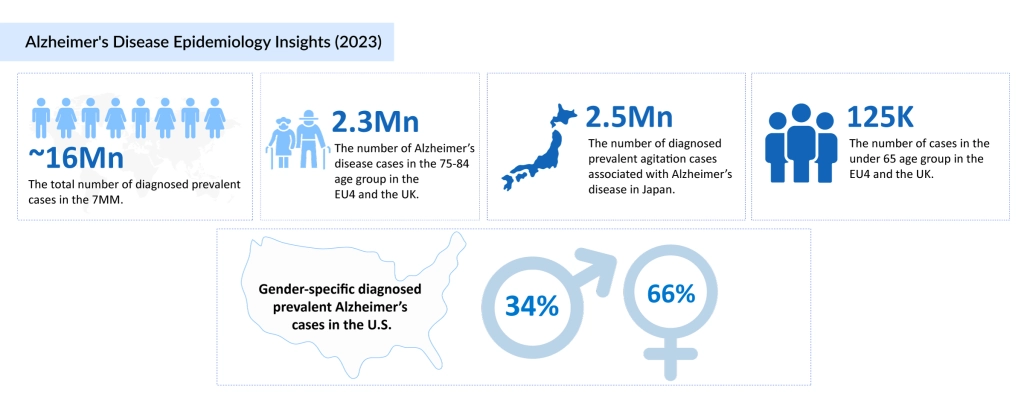Alzheimer’s Disease Market Overview: Treatment and Therapy Insights

Alzheimer’s disease is a progressive neurological condition that significantly impacts cognitive function, memory, and behavior. Affecting millions worldwide, Alzheimer’s poses a growing healthcare challenge. Advances in research and treatment are offering new hope for better management and improved outcomes.
Rising Incidence of Alzheimer’s Disease
The incidence of Alzheimer’s disease has been steadily increasing, particularly in regions with aging populations. While aging remains the most prominent risk factor, other contributors such as genetic predisposition, environmental exposure, and lifestyle factors are also linked to this upward trend. Additionally, improvements in diagnostic capabilities have enhanced early detection rates, further contributing to the reported growth in Alzheimer’s cases.
The Menopause-Alzheimer’s Connection
Emerging evidence suggests a link between menopause and an increased risk of Alzheimer’s. The drop in estrogen levels that occurs during menopause may accelerate cognitive decline, making women more susceptible to the disease. This connection has spurred interest in developing hormone-based therapies and gender-specific treatments to address this increased risk.
Psychosis in Parkinson’s and Alzheimer’s Disease
Psychosis, characterized by hallucinations and delusions, is a common yet often overlooked symptom in individuals with Parkinson’s and Alzheimer’s diseases. Managing these neuropsychiatric symptoms is crucial, as they can severely affect the patient’s well-being. Pharmaceutical companies are actively developing therapies that target both cognitive decline and associated behavioral challenges to enhance patient care.
Advancements in Alzheimer’s Disease Treatment
Recent breakthroughs have reshaped the treatment landscape for Alzheimer’s disease. Innovative therapies such as aducanumab and lecanemab have gained approval for their ability to reduce amyloid plaques, a hallmark feature of Alzheimer’s pathology. Researchers are also investigating tau-targeting therapies and other neuroprotective strategies to further improve treatment outcomes.
Potential Role of Diabetes Drugs in Alzheimer’s Prevention
Interestingly, some diabetes medications are being explored for their potential to reduce Alzheimer’s risk. By improving insulin sensitivity and supporting metabolic functions, these drugs may offer neuroprotective benefits that slow cognitive decline. This promising approach is gaining attention as researchers explore repurposed therapies for Alzheimer’s prevention.
Conclusion
As the incidence of Alzheimer’s disease continues to climb, advancements in diagnostics and therapeutics are offering new hope for patients and caregivers. Ongoing research into personalized medicine, innovative treatments, and preventative strategies holds significant promise for improving outcomes and enhancing the quality of life for those affected by Alzheimer’s. With continued scientific progress, the fight against this complex disorder is steadily advancing.
Latest Reports Offered By Delveinsight
anti-cd274 pd-l1 antibody pipeline | biotech consulting | cart-related neurotoxicity market | chiari malformation market | chronic granulomatous disease market | clear cell sarcoma market | clinically isolated syndrome cis market | coagulation analyzers market | compartment syndrome market | dental equipment market | diamond blackfan anemia market | extracorporeal membrane oxygenation devices market | healthcare consulting | healthcare consulting services | healthcare consulting solutions | healthcare partner identification services | heart sounds sensors market | hereditary spastic paraplegias market |
About DelveInsight
DelveInsight is a market research and consulting firm specializing in life sciences and healthcare. We deliver valuable insights to help pharmaceutical, biotechnology, and medical device companies succeed in a competitive and rapidly changing industry.
Contact Information
Kanishk
Email: kkumar@delveinsight.com
- Art
- Causes
- Crafts
- Dance
- Drinks
- Film
- Fitness
- Food
- Games
- Gardening
- Health
- Home
- Literature
- Music
- Networking
- Other
- Party
- Religion
- Shopping
- Sports
- Theater
- Wellness


